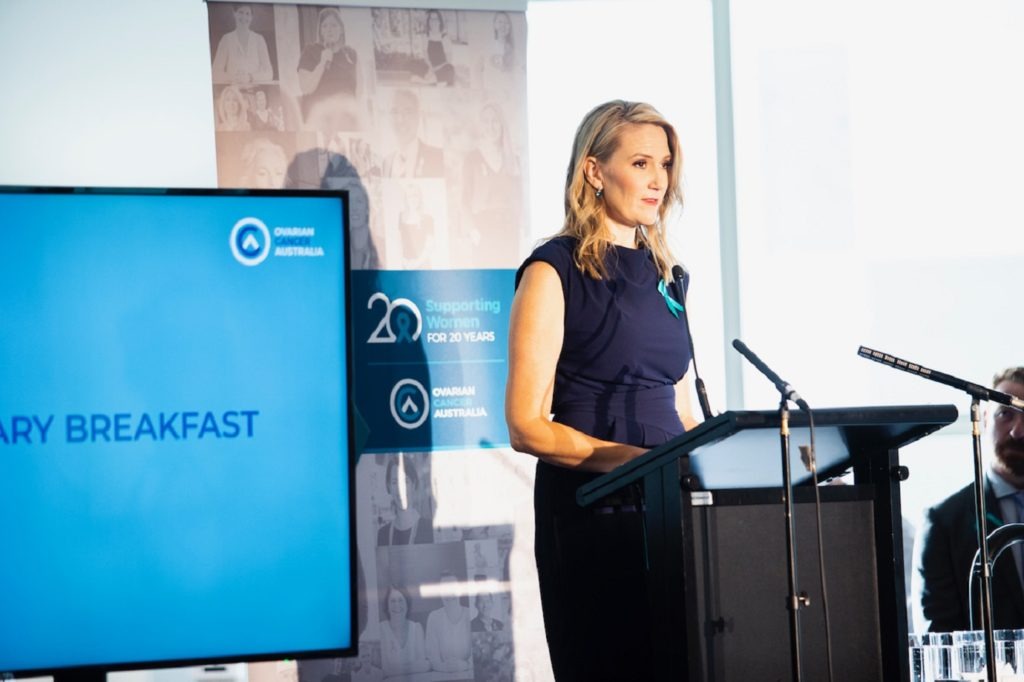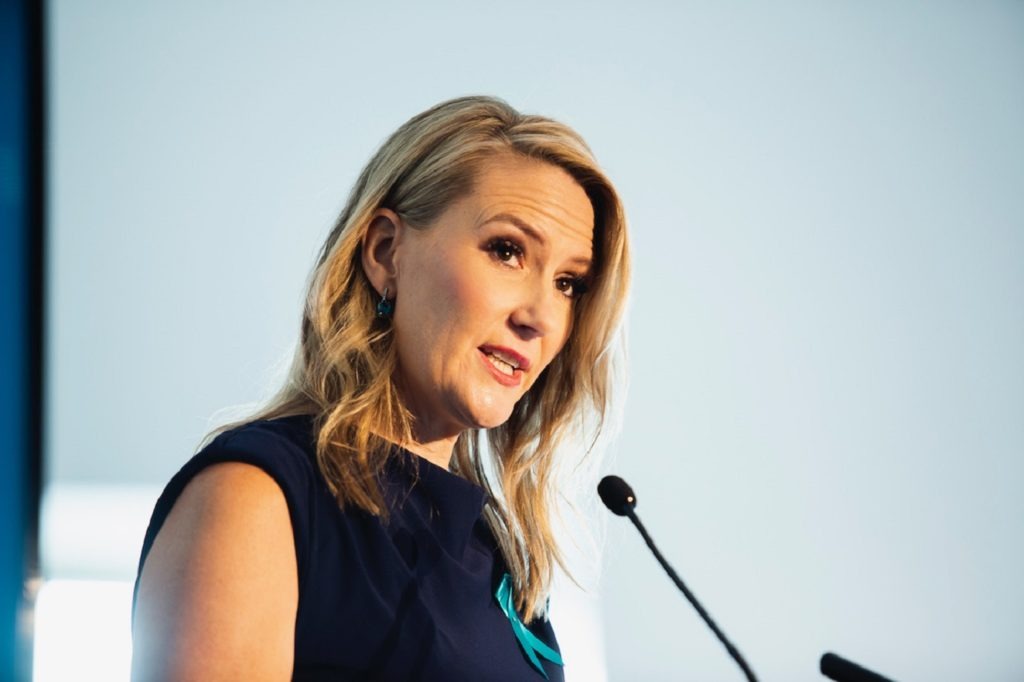The following piece was a speech delivered by Ovarian Cancer survivor, Caitlin Delaney.
Good morning. Thank you for inviting me to speak today and hearing my story. Breakfast with the Prime Minister is among one of the few but very distinguished positives about having stage four cancer. The others are: Lots of attention. Priority parking. More Pilates and massages than you can imagine. On the outside I’m essentially living like a Hemsworth.
On the inside however, I feel like a dead woman walking. I consistently have a foggy brain, chronic nerve pain which makes walking difficult, and digesting food is terrifying, all this thanks to the cocktail of very expensive drugs I am on. Which I guess makes me less Hemsworth, more Keith Richards.
I have a rare and nasty variant of the deadliest cancer on the women’s menu; stage 4, clear cell, ovarian cancer. I have no known risk factors and no obvious cancer in the family.
I was diagnosed exactly 4 years ago, aged 39. My children were tiny. I plunged into gruelling chemo and surgery and maintained cancer free status with the help of PBS-funded Avastin, which saved me $45,000. But the funded Avastin only lasted a year. I sourced funding for a second year, and as soon as I stopped Avastin, the cancer came back. It’s now in my liver and lymph nodes.
Unfortunately, chemo is not working this time, which means that treatment options for me are running out pretty fast. Due to my rare pathology, I am not a candidate for the many clinical trials, nor the PBS listed drugs which could prolong my life. It is infuriating! Like all rare cancers, there are simply not enough people to warrant a trial, or to gather meaningful data, and by definition there never will be. So currently, I have to offer up our family savings to buy a trial drug myself. It is keeping my disease stable, but it’s costing us $12,000 a month.

I have two beautiful daughters, Lilith 8, and Willow, 6. Neither of them can remember a time when they weren’t being stalked by this frightening, invisible monster that sometimes makes their Mummy so sick she can’t move. My beloved husband Kevin has had to take a step back from the job he loves as an actor to care for me, to lift me when I can’t stand, to comfort me when I wake up screaming in the night, to nurse my grief for what’s lost.
It is so cruel that my ovaries – the tiny organs that helped engineer the miracle of my daughters’ birth – are also the cradle of the disease that could take me from them. Nobody in this room knows when they are going to die, but I have got a better idea than most of you. And the only thing scarier than waking up to that every day, is the thought of my daughters having to withstand the worst blow that can happen to a child.

The mental torture of this disease is often worse than the physical torture. I can’t even imagine what it would have been like 20 years ago. A time where there was no Ovarian Cancer Australia at the other end of the phone, none of their support groups for women like me.
When you tell people you have ovarian cancer, there’s this face they get. It’s the Ovarian Cancer Gaze. An expression of compassion, fear, and pity. Sometimes people can’t even meet your eyes, because they think they know what your story is, or more significantly, how it ends. A doctor even once said to me: “This is just the story of ovarian cancer. This is what happens.”
Well quite frankly, that’s not good enough. It makes me want to scream. Because we CAN change the story.
Thirty years ago, women like me were getting the Breast Cancer Gaze. Now, when someone tells you they have Breast Cancer, what do you say to them?
You say: “You can beat this. It is not a death sentence. There is hope. Let’s get to work.”
I want to hear someone say that to me.
As an IVF scientist, I have the good fortune of being scientifically literate, so I have been able to explore treatments myself. This is prolonging my life, and every month – every extra hour – is precious. But what about the many women who live in regional areas, or don’t have family support, or aren’t as literate in the world of health science as I am? I am so scared for those women. They need help. We all need help. Ovarian Cancer Australia is doing everything they can to offer that help. Thank you.
I have seen glimmers of hope over the past 4 years since being diagnosed; more drugs on the PBS, more funding for research, and for the wonderful Teal Support Program. For all of this progress, thank you. Research-wise, we are on the cusp of significant advances. But we need true collaboration. We need leadership. We need MORE funding.
And when you make decisions here in Canberra, it DOES make a difference.
The power of human ingenuity has never been more in evidence. At this breakfast last year, imagine if I’d stood here and said: “Prime Minister, Health Minister, this year YOU will lead the world in withstanding a global pandemic for which a vaccine will be developed and distributed within a single human gestation period.”
The word “impossible” has never meant less. In the last year, a scary, strange year, I saw our country come together to achieve impossible things, and it gave me that ever elusive hope, because it told me that we can change the story. We CAN change the story of ovarian cancer.
To think about my daughters reaching adulthood, adolescence even, without me is unbearable. To know that they will reach adulthood in a world where ovarian cancer is not a death sentence would be something to hold on to, and it is why I’m here in front of you this morning.
I stand before you today because I AM still here, and I still have a voice. There are so many who don’t anymore, like my brave, late friend Jill Emberson, the founder of Pink Meets Teal who spoke to you two years ago. And there are so many of these courageous women you don’t hear, because they’re too sick or scared whilst battling this cruel disease. Please hear THEIR voices in MINE. Decisions made in this building CAN and DO change the course of history. Please help us change the ovarian cancer story now. We don’t have much time. Please help me change the story, for Lilith & Willow. Thank you.
THE WORD IMPOSSIBLE HAS NEVER MEANT LESS – THERE IS HOPE.
Photo credit: Hilary Wardhaugh

